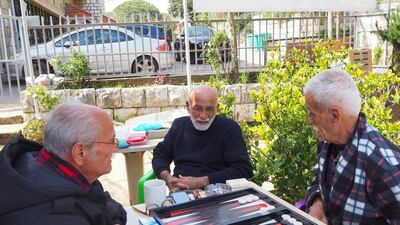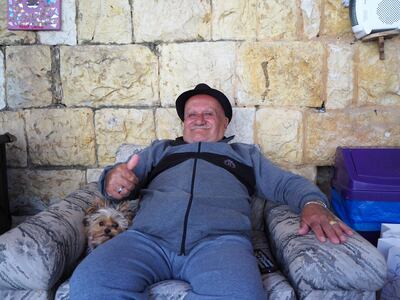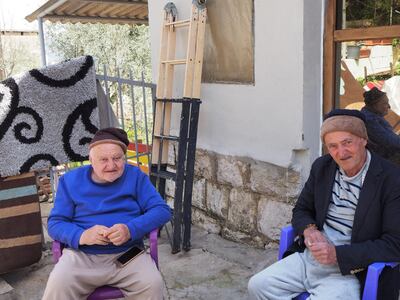In a garden on a hillside above Beirut, Maroun, Michel and Khalil sit playing backgammon in the morning sun. They are just three of eleven elderly residents of Beit Judoodna, a home for older Lebanese people who have fallen on hard times.
Situated in the village of Beit Mery, it is worlds away from the life these elderly men were living before they met founder Yara Bou Aoun.
Some residents slept on the streets, making whatever money they could by scavenging through rubbish bins, while those who did have a roof over their heads found themselves trapped in an abusive shelter system.
"My situation before was completely humiliating," 81-year-old Maroun told The National, fighting back tears as he described his previous experience living in a shelter in nearby Jdeideh.
“It was nothing like this,” he said. “We had to pay for everything: water, food, gas, electricity. But where were we supposed to get money from? None of us could find work.”
At Beit Judoodna, everything — food, medicine, clothes — is free and funded by public donations.
Senior citizens are set to make up more than a fifth of Lebanon’s population by 2035, according to a 2019 study by the Social Affairs Ministry and Saint Joseph University.
In the more immediate future, Lebanon’s most vulnerable populations, including the elderly, are likely to be exposed to greater risk over the coming months as the country faces its worst economic crisis in decades and the national currency rapidly devalues.
Decades of savings have been slashed, tens of thousands of people have lost their jobs and NGOs and government organisations have been forced to tighten their budgets.
Social support for the over 65s is already limited. A 2018 report by Lebanon’s hospitals syndicate found that only about one per cent of that age group live in retirement homes. Instead, most depend on traditional family support structures for accommodation and care.
But for those without families, finding a safe place to live can be almost impossible.
Sixty-five-year-old Michel’s wife and children live just three kilometres from Beit Judoodna, but he doesn’t see them. After spending more than a decade working in Saudi Arabia, he returned to Lebanon only for his marriage to break down.
With nowhere left to go, he began working for a man who forced him to do long shifts of manual labour in return for accommodation. “It was one of the worst places I have been in my life.”
Thanks to Yara, he now has a safe place to go. “I can’t tell you how nice it is to be here; it’s very calming.”
The old stone house was restored, renovated and furnished by a team of volunteers led by 31-year-old Bou Aoun, who said that she simply “could not accept” seeing people living in destitution in the final years of their life.
“When I found Yara, I didn’t even have 2,000 Lebanese pounds (Dh4.85) to take a taxi to the house, but she sent one to get me,” Maroun said.
“She is an angel, sent from heaven.”
The peace of the mountain village is broken only by the yapping of three small dogs, who rush to the metal gate to greet every newcomer and provide company to Beit Judoodna’s residents.
“I love these dogs so much,” said 74-year-old Youssef as he held a tiny Yorkshire terrier in his lap. “They bring me happiness and we get to take them for walks, get some fresh air.”
Bou Aoun insists on calling Beit Judoodna — Arabic for Our Grandparents house — a home, rather than the less personal “shelter” or “refuge.” She believes that doing so offers residents the dignity and respect they deserve.
“Whenever I used to meet people living in totally desperate situations, they would always ask one thing: give me a home,” she said.
For more than a year Khalil, 69 spent his days and nights living on Beirut’s seafront, after a series of failed business ventures left him bankrupt.
“I was staring out to sea, waiting to die,” he said. “But now, I am living. I truly believe [Yara] is Mother Teresa reincarnated, she shows so much love towards us.”
Michel, Khalil and 68-year-old Khaled joined Beit Judoodna around two months ago and are its three newest residents.
For the moment, Beit Judoodna only hosts men. “This wasn’t really on purpose,” Bou Aoun explained, “the men are just more visible, sleeping on steps or in pickup trucks.”
However, plans are under way to open Beit Sitna (Our Grandmother’s House), a home for vulnerable women. Bou Aoun described this project as “a real dream come true.”
She expects more demand for the services she provides as Lebanon’s economic crisis deepens.
“People can no longer afford rent, even for a tiny room, or can’t buy food any more,” which will likely force greater numbers of people into extremely vulnerable situations, Bou Aoun explained.
However, despite the difficult circumstances affecting people across the country, donations have been more generous than ever.
“I thought people would be more reluctant to give, but it’s actually the opposite. We have had more and more people offering to help.”



